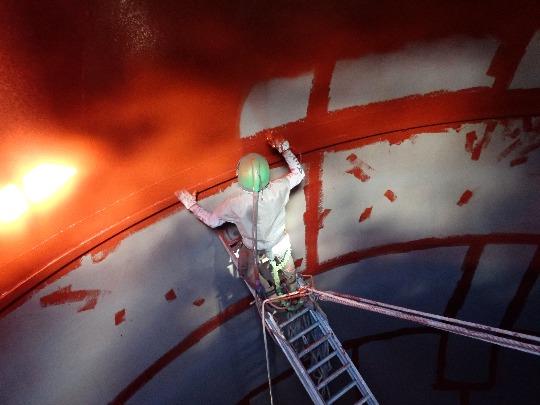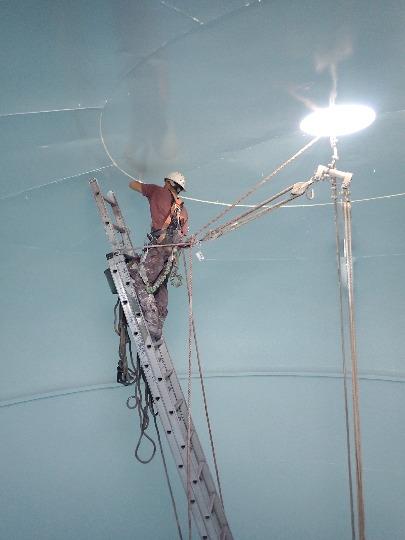Over the past two years, water tank, tower construction, and maintenance company Maguire has worked with the small town of Hitchcock, Texas, to restore several elevated water storage tanks. In late 2021, it all started with the town’s primary 250,000-gallon (946,352.9 L) tank.
“This was a job that was negotiated directly with the city,” says Brian Cooper, vice president of business development. In this case, the water tank specialist went the extra mile by partnering with Sherwin-Williams to recoat the tank’s interior. This partnership enabled the use of the coating manufacturer’s newly NSF 61/600 approved Sherplate 600 potable water epoxy coating, marking its first application since being approved for water storage tanks.
Located about 40 miles southeast of Houston and near the Texas Gulf Coast, the working window of late fall made for a fairly smooth application, in terms of weather and other environmental conditions.
Embracing New Technology
As a high-solids epoxy phenalkamide lining, the technology was free of restricted solvents and did not contain xylene, toluene, ethylbenzene, or oxsol. This made it ideal to meet increasingly stringent environmental regulations while still retaining some user-friendly properties.
Approved for potable water use in water tanks, pipes, ductile iron pipes, and water treatment plant assets, the coating’s high film-build and high edge-retention capabilities allow it to be used for stripe coating welds, edges, and corners before completing full lining applications, according to the manufacturer. While epoxy formulations containing solvents have long been preferred for stripe coating, many are no longer permissible under new regulations.
“This technology helps owners achieve maximum corrosion protection and environmental compliance, as well as support the contractor’s need for efficient, constructable product solutions,” says Paul Trautmann, marketing director for water infrastructure.
At 89-percent solids, the coating is easier to apply than 100-percent solids formulations, and it can be sprayed using either single-leg or plural-component equipment. Because it lacks restricted solvents, the coating is still permitted under new regulations, despite not being entirely solids-based.
“The coating sprays more like the single-leg sprayable, 70-percent solids epoxy linings poised for elimination,” Trautmann says. “Applicators not familiar with plural-component equipment have an easier learning curve.”
For Maguire, working directly with the manufacturer helped with both costs and logistics, since this job was completed during a period of supply chain challenges.

Project Planning
With materials and equipment on hand, Maguire brought a four-person contract crew to Hitchcock to address the wet interior of the double ellipsoidal tank and its welded steel substrate.
“The condition of the interior was fair,” says Cooper, whose crew needed to work quickly between the Thanksgiving and Christmas holidays. “The tank had some shallow pitting and the current coating system needed to be replaced, as it had reached the end of its service life.”
The most unique aspect of the 7,500-square-foot (696.8 m2) job involved its lofty height, which required extra personal protective equipment (PPE) in the form of fall protection. Using gear procured from GME Supply, crew members wore full-body harnesses at all times while being 100-percent tied off. They also used safety rope grabs supplied by Dakota Riggers.
Other PPE worn by the crew included items such as steel-toed boots, gloves, hard hats, safety glasses, and supplied air respirators from ABS Supply.

Blasting and Coating
The Hitchcock job began with crew members blasting all interior wet areas to achieve the NACE No. 2/SSPC-SP-10: Near-White Metal Blast Cleaning standard. Powered by an Atlas Copco 1,050 CFM air compressor, the crew utilized a 3-ton (2.7-metric ton) bulk sandblast pot with Black Beauty 30/60 media abrasive to sandblast all of the water tower’s interior.
Because their working window began just prior to a holiday, they then applied a coat of Corothane I Galvapac—a single-component, moisture-curing, urethane zinc-rich primer from Sherwin-Williams—to the steel. It went down at an average of 2.5-4 mils (63.5-101.6 microns) of dry film thickness (DFT), and this gave the crew the benefit of time flexibility.
“Due to Thanksgiving, we applied a coat of Galvapac to hold the blast and avoid having to rework after the holiday,” Cooper says. For Maguire, giving those hard-working crew members some time off to celebrate holidays with family and friends is important!
Once they returned from that brief holiday break, Maguire’s crew brush applied a thin coat of Sherplate 600 in red to all welds, angles, and pits. Upon mixing the epoxy phenalkamide material for use, the temperature began at 75 °F (23.9 °C) and rose to approximately 85-90 °F (29.4-32.2 °C) when sitting in hoppers. To help manage its pot life, the crew mixed small amounts of material and thinned up to 5 percent with acetone.
The second day after returning was the big one for crew members, since that’s when all areas of the interior were to be coated. To do this, they sprayed down all interior areas of the water tank at 7.0-9.0 mils (177.8-228.6 microns) of wet film thickness.
“A Graco King 60:1 pump with a direct feed hopper was used with 100 feet [30.5 m] of half-inch [1.3 cm] hose, necked to 50 feet [15.2 m] of three-eighths-inch [1.0 cm] hose and a quarter-inch [0.64 cm] whip,” Cooper says of the spraying process. The application was completed using a Graco XHP gun with a TrueAirless 519 spray tip.
Finally, after allowing the intermediate coat to cure for approximately 48 hours, crew members returned and sprayed on a light-blue finish coat at the same thickness. They used the same equipment set-up and application process as the intermediate coat.
That total system thickness was enough for the applicator to achieve the desired ICS-5 guideline of the American Water Works Association under its “AWWA D102-21 Coating Steel Water-Storage Tanks” standard, which calls for at least 10.5 mils (266.7 microns) DFT. That was easy to achieve with the Sherplate 600, which can be applied at up to 16 mils DFT per coat and up to a total system thickness of 24 mils DFT.
Reaping Rewards
In under two weeks, and even while navigating some time off for the crew to enjoy its Thanksgiving holiday, Maguire finished its job on time and on budget. The client was pleased by their work, and they quickly found evidence of that in the form of an expanded partnership.
“The City of Hitchcock was very excited about our work, and we’re working on a video testimonial with them because they were so happy with the results,” Cooper says. “We love partnering with communities like Hitchcock who believe in long-term, sustainable maintenance for their elevated water storage tanks.”
Indeed, Hitchcock proved how impressed it was by awarding contracts for three other tanks in the city, with all work wrapping up by early 2023. It’s all part of a very busy decade for Sioux Falls, South Dakota-based Maguire Iron, which recently rebranded as Maguire while announcing plans to open a state-of-the-art campus and fabrication facility in 2024 at its headquarters.
“Because of the opportunities, we felt there was no better time to look at a rebrand than the timeline we are in right now,” CEO Gene Jones Jr. says. It all starts with hard-working crew members, and their work on jobs like Hitchcock is being rewarded in more ways than one.
This article was repurposed from CoatingsPro Magazine at www.coatingspromag.com.